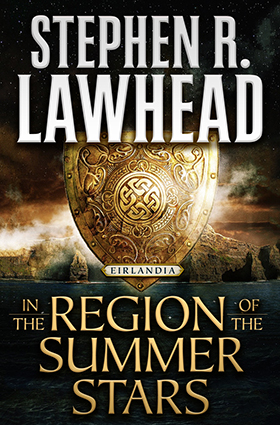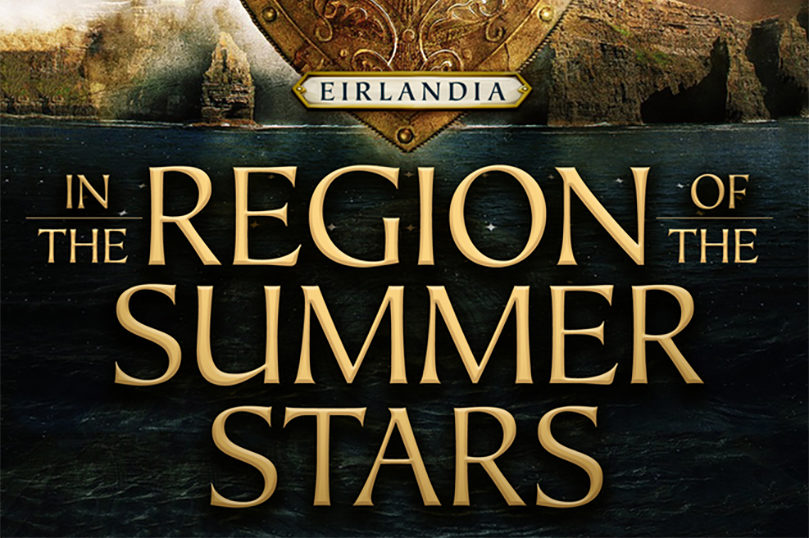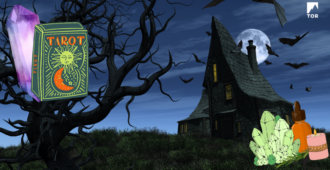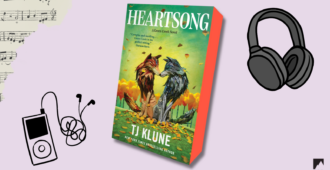opens in a new window opens in a new window
opens in a new window opens in a new window
opens in a new window opens in a new window
opens in a new window opens in a new window
opens in a new window
opens in a new window Ravaged by barbarian Scálda forces, the last hope for Eirlandia lies with the island’s warring tribes.
Ravaged by barbarian Scálda forces, the last hope for Eirlandia lies with the island’s warring tribes.
Wrongly cast out of his tribe, Conor, the first-born son of the Celtic king, embarks on a dangerous mission to prove his innocence. What he discovers will change Eirlandia forever. For the Scálda have captured the mystical Fae to use as an ultimate weapon.
And Conor’s own people have joined in the invasion.
opens in a new windowIn the Region of the Summer Stars will be available May 15th.
Conor
I was ten summers old when the world changed. Twelve more have passed since then, yet I recall the details of that day as if it had happened yesterday and I was still that bare-legged boy.
Along with the other boys of the ráth, my younger brothers and I were playing at hare and hounds when a rider appeared on the coast path. Visitors were a rare enough diversion that we dropped our game and ran to see who it might be.
We followed him for a closer look. The stranger was tall and gaunt, with a face burned brown by the sun and burnished by the wind. His eyes were sunk deep in his skull and looked out upon the world with the keen and haughty stare of a hunting hawk. His clothing and appearance marked him at once as something strange and mysterious to our young eyes. Instead of the ordinary breecs and brócs, siarc and belt we knew, the stranger wore a knee-length robe of rough grey cloth and high-laced brócs of soft leather; a blue-and-yellow–checked cloak, folded neatly, lay across the rump of his mount. Instead of a leather belt, he wore a wide band of horsehair and wool dyed blue and green and woven into peculiar patterns; on a wide strap across his chest hung a large sparán of the same stuff, bearing the same odd symbols and, around his neck, a silver torc as thick as a ram’s horn.
If his manner and dress seemed bizarre to us, his horse was even more extraordinary. A fine and spirited animal it was, with a glossy coat the colour of new-peeled chestnuts. Lean, well-muscled, and elegant in every line and sinew, it was surely a very prince of its breed. Its mane and tail were plaited with threads of gold and a collar of golden sun disks hung around its sleek and graceful neck. The heavy horsecloth on his back was worked in the colours of the rainbow, and finer and more costly than any garment ever worn by anyone we knew. No one in our tribe had ever seen, much less owned, such a mount—not even our king, whose last horse was an old flea-bitten mare that died some while before I was born.
But this! This animal—oh, it was a handsome creature and its value well beyond our poor ability to reckon. That alone should have given our lord fair warning. It did not.
With the other lads, I stood in flat-footed awe and admiration of the magnificent beast, and received a sharp elbow in the ribs. ‘Oi!’ I glanced around to see who had jabbed me and saw Fergal, my best friend, pointing at the stranger.
‘Look . . . ,’ he whispered in a half-swallowed voice.
‘I see him,’ I hissed. ‘Why did you poke me?’
‘His hair . . .’
‘What so?’
‘He’s a druid!’ said Fergal, scarcely breathing the last word.
I tore my gaze from the horse and again regarded our visitor; he did possess a curious cut: close shaven from ear to ear over the top of his head, yet falling long everywhere else, save two short braids—one at either temple. We boys had never seen one of the druid kind, but Fergal seemed to know all about them. Even so, the fact that the stranger travelled alone on a mount the worth of an entire herd of lesser steeds gave us all to know that we were gazing upon a person of high rank and importance.
Still, it did not take a druid skilled in the arts of augury to foresee the future that day. Even a gang of muddy, skinny-shanked boys knew and understood that a thing of great significance was about to take place.
Looking neither right nor left, the druid proceeded directly through the gates of the stronghold and into the common yard, reining up outside the king’s hall. There he sat on his splendid horse, upright as a hickory rod, his hooded eyes sharp, all-seeing, taking in the measure of the place while he waited to be received in a manner befitting his exalted status.
When our king sent Barga, his hearth master, in his stead the muttering began.
‘Great of Wisdom, may you prosper in all things as you so richly deserve,’ declared Barga grandly. Clearly embarrassed, he tried to disguise his discomfort with high-sounding flattery. ‘As the sun honours the earth with light, so you honour us with your radiant presence. My lord and king waits with intense eagerness within.’ He put out a hand to the open door of the hall. ‘Will you join him and share the welcome cúach?’
The druid frowned, but slid down from his horse and tossed the reins to one of the men standing near. The two entered the hall and, as we boys were not allowed inside, we all huddled around the door and peeped around the edges of the speckled ox-hide covering, hoping to catch any glimpse of what might happen within. The hall was dark; there was no fire in the hearth, no meat roasting or bread baking. Darkness suited our king’s mood most days. Besides, meal and meat is costly and our lord knew well the value of such things.
Jostling around the doorposts, we saw little and heard less. But our elders clucked their tongues and shook their heads and wore their worried faces. Then, Barga appeared at the door and shooed us away. We scattered and ran off to further examine the druid’s horse instead. One of the men, Aideen’s father as I recall, had led the animal to the stone trough where it now stood with its broad muzzle sunk deep in the water. The creature’s legs were straight and sturdy, its shoulders and haunches strong; the ruddy coat seemed to glow in the sunlight with a fire all its own. I know I had never seen such a beautiful animal in my life, and I believed then that I never would see another like.
‘Someday, I will own a horse like this,’ I announced grandly, and was disappointed to see that none of my friends took me seriously.
‘Ach, and where would you be getting a horse like this?’ demanded Fergal.
‘From the faéry folk, maybe?’ laughed Donal.
By way of reply, I gave him a punch on the arm. ‘I will, you know. I’ll get one—wait and see if I don’t.’
Our appraisal of the animal was interrupted just then as one of the king’s handmaids emerged from the hall, leading the strange druid to a house on the common—the little house used as a guest lodge. So few visitors troubled our king’s hospitality that the building was less lodging for guests and more storeroom; its furniture was old stuff, and there were grain sacks stacked along the walls and casks of ale and mead and wine in the corners. Women sometimes used the hearth for drying fish and cloth, and on rainy days we were often allowed to play there.
We saw the maid lead our visitor into the house, linger a little at the door, and then walk slowly back to the hall as if to a funeral, perhaps her own. But she had not yet reached the hall before the druid appeared again in the yard. And, oh, his face was black with rage. The quick among us realised at once what was wrong. Thanks to our niggardly king, our guest had been snubbed and his position held small: not the promised drink in the silver cúach, nor bread on the board or meat on the platter—not even so much as a smear of honey on a barley cake or humble pinch of salt and sip of wine to welcome him and ease the pangs of his journey. That alone would have been enough to anger him, but the shabby lodgings taxed his forbearance beyond reason. Who could blame him?
By now, some few of the warriors had come out of the hall and others had abandoned their chores and weapons practice. Most of the clan had gathered to get the measure of the visitor, and everyone witnessed his humiliation at the hands of our king. The muttering grew louder and more anxious.
Glaring poison at us, the great man marched to the centre of the common yard and squatted down in the dirt. Placing the palm of his hands one on either cheek, he closed his eyes and in a moment began swaying back and forth on his haunches. Then, rousing himself, he reached down and drew a circle in the dust. Into this circle, he inscribed three lines and covered the lines with his hand, pressing down upon them; he then drew the outline of that hand in the dust with the thumb of his free hand.
This last I remember most clearly, for next he stuck that dirty thumb in his mouth, closed his eyes, and chewed. He chewed hard on that thumb as if on a marrowbone. After a time, he stood and raised his right arm to the sky as if he would drag down the sun. Stretching out his left arm, he pointed straight at the king’s hall. Then, with his arms so extended, he turned slowly around taking in the entire fortress with the wide sweep of his outstretched hand.
We watched enthralled by these curious actions as he made one turn, then two more. On completing the third circle, the great man brushed the dirt from his hands and, stalking to where the men stood holding his horse, he snatched away the reins, mounted his steed, and rode to the centre of the yard. Drawing himself upright in the saddle, the druid lowered his brow and, in voice loud and terrible enough to wake the dead, he called, ‘Woe to you, Eochaid Tight-Fist, and woe to the people who must live beneath the grudging meanness of your wicked gold-lust.’
The elders among us groaned at this, but worse was to come. ‘Woe to you, little king! This day a reckoning is required of you. This is the day of your undoing,’ he proclaimed. ‘Know you, the disaster soon to devour this land might have been blunted if only you had shown a proper respect. Instead, suffering shall fill your cup and the cups of all who call you lord. Tribulations without number will rain down upon Eirlandia and its people until they are ground to dust and scattered to the four winds.’
Then, turning his face to the sky, he intoned a long incantation in the Dark Tongue. I heard the strange, unsettling words and my young heart seized in my chest.
When he finished, the druid looked down from his horse and said, ‘The curse has been sealed to the fifth generation. It cannot be broken.’
Picking up the reins, he wheeled his mount and rode from the ráth. We all gaped in horror at his judgement. No one lifted a hand to prevent his leaving until, as he passed through the gate and out onto the track beyond the walls, one of the warriors broke ranks and ran after him. I looked and was startled to see that it was my own da. I did not know my father could move so fast. Since there was no one to restrain me, I ran after him.
Father caught up with the horse and rider out on the coast track a short distance from the fortress walls. ‘Wait!’ he called. ‘A word, Learned One, for mercy’s sake.’
The druid halted and turned around. My father dropped to his knees and went down on all fours in middle of the trail. ‘You have condemned our king and his punishment is not a day too soon. The world knows our people have suffered enough under his rule. But I beg you, sir, wise prince—I beg you on my life and honour as a warrior of rank and skill—please, lift your curse for the sake of our tribe.’
The druid, his face like flint, sat silent as an oak and gazed upon my father, grovelling on hands and knees in the dust—a thing no warrior would ever do, even in the face of death. And yet my father did just that. My gut squirmed with embarrassment for him; I glanced around, fearful that the whole world should be watching and see him so, and me with him. The blood-red birthmark that stains the side of my face tingled and burned with shame; I lowered my gaze and looked away.
Even so, I was close enough now to hear what passed, and when the druid spoke again, his voice had lost much of its righteous anger. He spoke more like an ordinary man. ‘Sooner call back a spear in flight,’ he replied with a bitter laugh. ‘Sooner call back the stone hurled from the sling.’
Though it broke my young heart to see my father so debased before this haughty man, and though that proud warrior must have known the eyes of his son—and those of the greater part of our clansmen—were witness to his disgrace, still my father did not relent. ‘I know you are wise in the ways of all things under heaven,’ he said. ‘If such a thing can be done, you are the very man to do it. That is why your servant begs you, please, for the sake of my innocent sons and the sons of our clan, and those of our daughters yet to be born, take back your curse.’
The druid sat long and stared at the man pleading before him. ‘You say you have sons,’ he replied at last, gazing down from his high horse. ‘How many?’
‘I have three.’
‘What are they to you?’
My father paused to consider his answer.
‘I ask you, warrior, and demand an answer. What are your sons to you?’
‘They are the light in my eyes, the breath in my lungs, and the sweet honey mead on my tongue.’ My father’s answer was good and true and came from his heart. ‘All this and more,’ he added, ‘no less the other children of our poor clan.’
The bard did not reply to this. In the silence, I dared to raise my eyes and saw that he gazed, as it seemed to me, in deep contemplation.
My father seized the opportunity to press the matter further. ‘I know the Darini are not accounted much in this worlds-realm. As a clan among clans—even within our tribe—we are least and our name is lower than any other. This is because of our lord and the lord before him. Though we have no claim to dignity, some of us still have pride. For the sake of—’
‘Enough!’ roared the druid, his voice echoing back from the high timber wall of the fortress.
At this the great one climbed down from his horse. He stalked to where my father knelt and stood over him. ‘Get up on your feet.’
My father rose and stood before him.
‘What is your name?’
‘Ardan mac Orsi,’ he answered.
The druid nodded and placed his left hand upon my father’s heart. Then, raising his right hand, he held it above my father’s head and in a voice to freeze the marrow in the bone, he said, ‘For the humility and respect you have shown me, Ardan mac Orsi, I tell you the truth: your sons will be kings and the champions of kings.’ He lowered his hand and touched my father’s brow. ‘This, I have seen. This, I have spoken.’
‘I am honoured, lord.’
‘You say rightly, friend. Yet, as everyone knows, with honour comes obligation. This day you must give me one of your sons.’
My father gasped. His mouth opened and closed. When he at last found his voice, he said, ‘This is a hard thing you ask of me—sooner ask the mountain to give up its gold.’
The druid smiled at this.
‘The cost is greater than I can bear,’ my father pleaded. ‘How could I choose such a thing?’
To my surprise, the bard’s piercing eyes swung to me. ‘This is one of them, I think.’
My father glanced at me and with a gesture warned me to stay back. ‘Yes,’ he allowed hesitantly. ‘This is Conor—oldest of the three.’
The druid’s eyes narrowed as he observed the ruby stain that discoloured my cheek, and the merest lift of a dark eyebrow gave me to know I had been judged and found wanting. ‘Not him,’ he said, dismissing me at a glance. ‘Show me the others.’
Ach, my blood boiled—as it so often did when anyone made bold to mention, much less deride, the unsightly blotch of a birthmark that stains my face. Writhing with embarrassment, I lowered my eyes and stepped aside as my father summoned Liam and Rónán. Of my brothers, Liam is a year younger but almost as tall and strong as me, and Rónán is four years younger still.
The bard took one look at the two of them standing barefoot in the dust of the road and stretched out his hand toward Rónán. ‘The youngest shall be mine.’
I saw my little brother’s eyes grow wide with alarm, and I started forward. ‘Take me!’ I said, starting forward. ‘Take me instead.’
‘Conor! Stay back,’ shouted my father. He then turned his face to the sky and drew a deep and heavy breath. ‘Is there no other way?’
‘Tears are not a becoming ornament for a warrior,’ the bard observed. ‘Why so sad?’
‘How not? You take away my truest treasure.’
The druid smiled again and gently shook his head. ‘Think you now, who would not give dross for gold? Cheer up, man. This day, you give me a brat. Tomorrow, I give you back a bard.’
This is how it came to be that little Rónán rode off clinging to the great druid on his splendid red steed. Later that same day, King Eochaid, known henceforth as the Tight-Fisted, was pulled from his noisome hall and thrown out of the fortress; the gold torc was torn from his throat and the gates barred against him. His grasping avarice had secured the doom of our long-suffering people and every last clansmen turned his hand against him without pity.
Three days later, the Black Ships came. In their thousands they came, and Eirlandia sank beneath wave upon wave of the invading Scálda warhost.
Thus, the world is changed—not with a sword, but with a word.
Copyright © 2018 by Stephen R. Lawhead
Order Your Copy
opens in a new window opens in a new window
opens in a new window opens in a new window
opens in a new window opens in a new window
opens in a new window opens in a new window
opens in a new window






